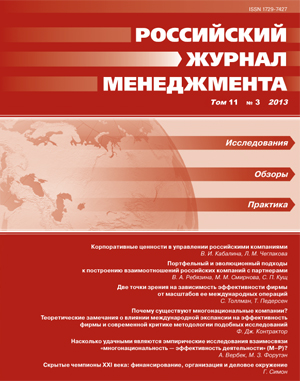Сorporate Values in Management of the Russian Companies
Abstract
The paper discusses the results of research into a new approach to management — management-by-values (MBV) — in the Russian companies. The research is based on a multiple case studies strategy and aimed to reveal the common features and variance of approaches of Russian companies to the creation of a corporate management system based on organizational values, taking into account a diverse context — the external and internal environment of the organization. Three companies of different sizes and branches (coal and mining industry, finance, and developer business) with different organizational structures have been chosen as the empirical objects for case studies. The creation of the MBV system is considered as a process passing through several stages. The paper also covers the factors that contribute and impede the processes of MBV creation and the interplay between personal and corporate values.
Keywords:
management-by-values, personal and corporate values, stages and mechanisms for implementation of MBV
Downloads
References
The List of References in Cyrillic Transliterated into Latin Alphabet
Downloads
Published
How to Cite
Issue
Section
License
Articles of the Russian Management Journal are open access distributed under the terms of the License Agreement with Saint Petersburg State University, which permits to the authors unrestricted distribution and self-archiving free of charge.





